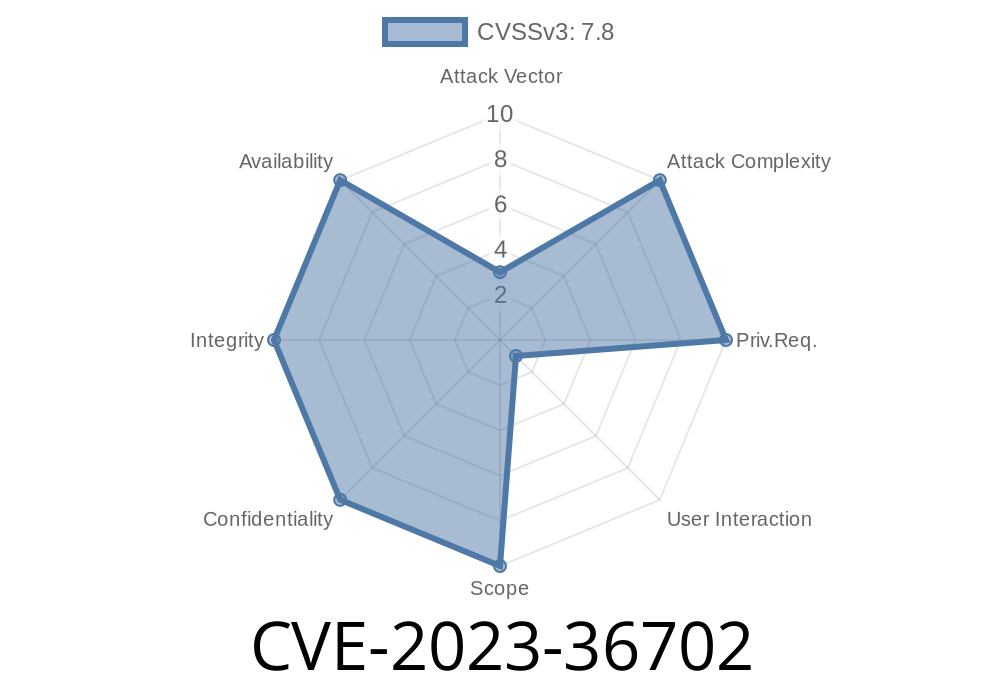Cybersecurity threats come in many forms, and one of the more concerning vulnerabilities discovered recently is catalogued as CVE-2023-36702. This security flaw affects Microsoft’s legacy multimedia component — DirectMusic. In simple terms, this bug could let remote attackers run arbitrary code on your system just by making you open a specially crafted file, risking privacy and control over your computer.
In this article, we'll break down what CVE-2023-36702 is, how it works, what makes it dangerous, and how attackers might exploit it. We’ll also provide practical insight and code snippets to better understand the inner workings. Let’s make this clear and straightforward.
What is DirectMusic?
DirectMusic is an old multimedia component used by Microsoft Windows for playing music and sound through games and applications. While not widely used now, legacy support means parts of it are still present on Windows—even on upgraded modern machines.
What is CVE-2023-36702?
CVE-2023-36702 is a remote code execution (RCE) vulnerability in Microsoft DirectMusic, detailed in Microsoft’s official security guidance:
- Microsoft Security Update Guide: CVE-2023-36702
- MITRE/NVD: CVE-2023-36702
A remote attacker could exploit this by crafting a malicious file (like a special MIDI or sound file) and tricking a user into opening it. Once opened, the attacker gains the ability to run code on your machine with your permissions.
1. Where’s the Vulnerability?
The vulnerability lies in the way DirectMusic parses and processes certain musical data files (such as MIDI or DirectMusic Segment files .sgt, .mid). Improper handling (usually a buffer overflow or use-after-free) allows attackers to execute code of their choice.
2. How Does an Attack Work?
- The attacker creates a *malicious MIDI/SGT file*.
- The victim is convinced to open or preview the file (for example, as an email attachment or download).
- When opened, the unsafe code embedded in the file takes over part of DirectMusic’s memory, letting the attacker run arbitrary commands.
Example: Malicious MIDI crafted for Buffer Overflow
Imagine we have a vulnerable buffer in DirectMusic that copies file data into a fixed-length stack buffer:
// Simplified pseudo-code:
void ParseMidiEvent(char* eventData) {
char buf[128];
strcpy(buf, eventData); // No length check!
// ...process buf
}
An attacker could create a MIDI event with more than 128 characters, which would overwrite memory past buf, possibly replacing the return address and hijacking the program’s flow.
Proof-of-Concept (PoC) *Pseudo-code*
*Note: This is a conceptual demonstration, not an actual exploit.*
# Python3: Create a MIDI file with an oversized event payload.
with open("exploit.mid", "wb") as f:
f.write(b'MThd') # MIDI header
f.write(b'\x00\x00\x00\x06') # header length
f.write(b'\x00\x01\x00\x01\x00\x60') # type, ntrks, division
# Track chunk with oversized data
f.write(b'MTrk')
payload = b'\x90' + b'\x41' * 256 # Status byte + 256 bytes (overflow)
track_data = payload + b'\x00\xFF\x2F\x00' # End of Track
f.write(len(track_data).to_bytes(4, 'big'))
f.write(track_data)
If this file was opened by a vulnerable DirectMusic parser, it could cause a buffer overflow, potentially letting malicious code execute.
Further compromise: Malware could be installed, letting attackers take full control.
What makes CVE-2023-36702 serious is how simple it is to trigger — *just opening or previewing a file is enough*.
Mitigating the Risk
Microsoft’s Fix:
Microsoft released a patch in their September 2023 security updates. Make sure your system is running the latest Windows updates.
References
- Microsoft Security Guidance: CVE-2023-36702
- NIST National Vulnerability Database: CVE-2023-36702
- DirectMusic Overview (Microsoft Docs))
- SANS Internet Storm Center: September 2023 Patch Tuesday
Conclusion
CVE-2023-36702 highlights the dangers lurking in legacy software components like DirectMusic. Even rarely-used features can become vectors for serious attacks. Always keep your software updated and treat unexpected attachments with caution.
If you’re a Windows user, check your update history — and make sure you’re secure from flaws like this one.
Timeline
Published on: 10/10/2023 18:15:15 UTC
Last modified on: 10/12/2023 22:23:09 UTC
